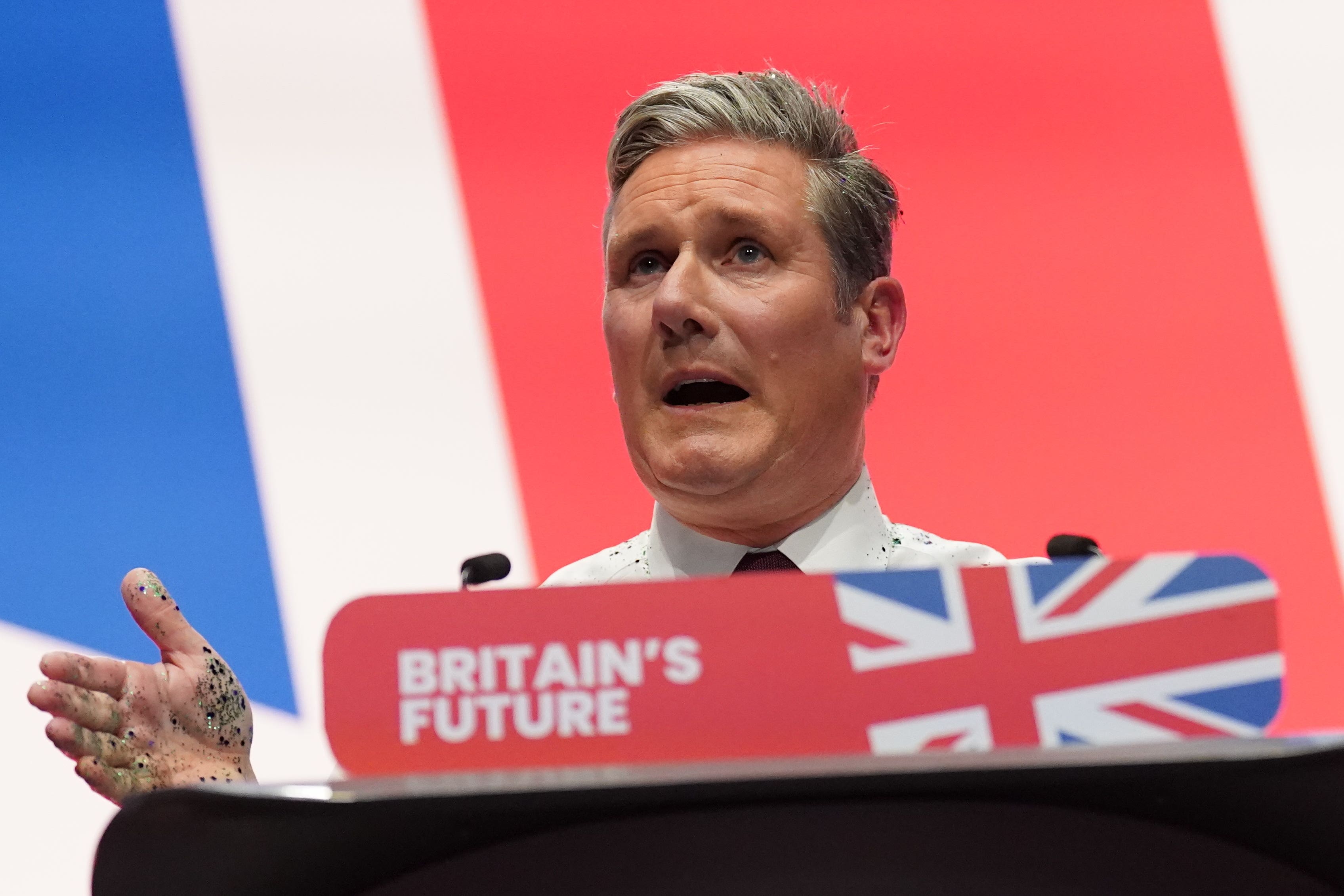Starmer’s medicine could be hard for Labour to swallow. Tory voters will lap it up
No landmark leader’s speech guarantees election victory. But Keir Starmer passed his audition to present himself as a creditable PM-in-waiting, writes Andrew Grice


Keir Starmer’s speech to the Labour Party conference was his audition to be a credible prime minister-in-waiting – and he passed the test.
His target audience was first-time Conservative voters in 2019 and the many “don’t-knows” who have had enough of the Tories but not yet moved into the Labour column. There wasn’t much new policy, and certainly not the “retail offer” on which Labour will fight next year’s general election, which disappointed many Labour figures.
Instead, it was broad brushstrokes. The only surprise came when a heckler invaded the platform at the start, throwing glitter over a shocked Starmer, who quickly turned potential disaster to his advantage by citing Labour’s transition from a party of protest to one of power.
Starmer delivered a strong critique of the Tories’ cycle of “drift, stagnate, decline” and leaders including Rishi Sunak who, he claimed, simply do not understand the daily struggles of millions in the cost of living crisis.
He positioned himself as their champion and tackled their reservations that his knighthood (awarded for public service as director of public prosecutions) makes him look a posh establishment figure. “I grew up working class,” he said, recalling that their “pebble-dashed semi was everything to my family”.
The Labour leader offered to heal the wounds left by the Tories, in a shared endeavour with the British people to “face down the age of insecurity together”.
Having attended every Labour and Conservative conference since 1982, I’ve learned that a landmark leader’s speech – and Starmer’s was one – doesn’t guarantee election victory. That follows when a leader captures the nation’s mood and convinces voters they can deliver what people want.
Ominously for the Tories, Starmer reflected today’s hunger for change, as Tony Blair did at the 1996 Labour conference, promising a new “age of achievement” with a 10-vow “performance contract” – more detailed than Starmer’s five more woolly missions on “higher growth, safer streets, cheap British power in your home, more opportunity in your community, the NHS off its knees”.
Blair would never have dared to assume two terms in office, even after winning a massive majority. Indeed, Starmer’s promise of a “decade of renewal” worried some Blair-era figures, even though Starmer warned his party the election fight has “barely begun”.
Similarly, the downbeat mood at last week’s Tory conference in Manchester reminded me of the party’s 1996 gathering – a divided and exhausted government out of ideas after a long spell in power. In 1996, the Tories were preparing for opposition and Labour for government. It feels the same today.
Yet one big difference haunts the conference here in Liverpool: Blair inherited a growing economy. Starmer will not.
I thought his most powerful line was: “If you think our job in 1997 was to rebuild a crumbling public realm, that in 1964 it was to modernise an economy left behind by the pace of technology, in 1945 to build a new Britain out of the trauma of collective sacrifice, then in 2024, it will have to be all three.”
The parallel Starmer most wanted was probably with the post-war Attlee government, which created the modern welfare state, which Labour regards as its finest hour. “People […] want us to build a new Britain, and we are the builders,” Starmer said, pledging to “fix tomorrow’s challenges, today” and not to be dragged back to the easy, short-term answers of the Tories.
His plan for a “new generation of new towns” echoed the first wave allowed by the 1946 New Towns Act. He would “bulldoze” his way through planning restrictions and build houses in the “grey belt” – land officially in the green belt but ripe for development – insisting this would not destroy the green belt created by the Attlee government.
Starmer has been thinking about 1945 recently. In a new foreword to a biography of Attlee by Nick Thomas-Symonds, a shadow cabinet member and close ally, Starmer writes: “It is extraordinary that the Attlee government accomplished so much in so little time – and in such inauspicious circumstances.” (Attlee got six years before losing an election.) Crucially, Attlee spelt out a clear programme in opposition and did not deviate from it in power. This informed Starmer’s five “missions”. So if he puts more flesh on the bones, voters may see a 10-year programme for government.
Starmer’s audience loved his speech, despite unpalatable medicine for Labour, such as the need to reform the NHS; a “genuine partnership” with the private sector, whose funds would be needed for investment and his declaration that “fiscal responsibility is non-negotiable”.
Starmer’s other challenge today was to create a sense of hope. He said: “Our way back from this will be hard, but know this: what is broken can be repaired. What is ruined can be rebuilt. Wounds do heal. And ultimately that project – their project – will crash against the spirit of working people in this country. They are the source of my hope.”
Fine, but more work required. By the election, Starmer will have to become Bill Clinton, who was born in Hope, Arkansas, and transformed the 1992 US presidential election with a video called “A Man from Hope”, and a speech in which he said: “I still believe in a place called Hope.”
His party, many previous critics included, now believes in Starmer. His speech will help the country do the same.








Join our commenting forum
Join thought-provoking conversations, follow other Independent readers and see their replies
Comments